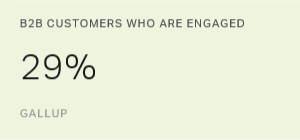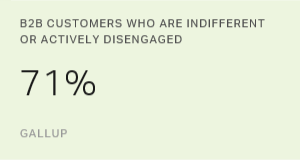Story Highlights
- Stronger account teams create more organic customer growth
- The product-based sales model is obsolete
- Consultative selling focuses on the customer's business and challenges
Many companies seek to grow by acquiring their competitors. But at some point, an aggressive acquisitions strategy hits a wall.
Gallup finds more long-term potential in organic growth -- that is, getting much more business from existing customers. But this approach poses a major challenge for business-to-business companies right now. According to recent Gallup research, only 29% of B2B customers are engaged, while 60% are indifferent and 11% are actively disengaged. Relationships won't grow organically alongside those low levels of engagement.

One way to strengthen those relationships -- and to create organic growth -- is through building more effective B2B account teams. Gallup has observed and worked with hundreds of account teams and conducted tens of thousands of customer interviews. Through this discovery process, we identified the core characteristics of the most successful account teams.
In general, these teams are defined by their customer-centric worldview. They have a good sense of where the customer's business has been and where it is going, and they strategically align with the markets they serve. These teams' companies enable them to build exceptional strategies for customers. Their companies give them a certain freedom in how they operate to ensure that the teams meet customers' needs.
Positioning Salespeople as Consultants
Beyond these generalities, there are specific actions B2B companies can take to build stronger account teams and, thus, stronger customer relationships. And one of those actions is to position salespeople as consultants.
Traditionally, companies structure their sales teams around a product-based model. But as customers' wants and needs have shifted, this model has become nearly obsolete. Companies achieve more for their customers and themselves through a consultative sales approach.
The product-based or traditional approach to selling relies heavily on salespeople pushing a particular product or service. Here, salespeople are hyper-focused on the features and benefits of whatever they are promoting. Their sales pitch consists of a canned presentation and a slick brochure, which is all too familiar to leaders already strapped for time. It doesn't command their attention or demonstrate what they are looking for from a B2B company, which is value.
In contrast, a consultative sales model starts with a discussion about the customer's business and business challenges. Consultative salespeople do research, ask questions and listen. They provide customized, not generic, solutions based on their findings and discussions. Consultative salespeople are selling a product or service, of course, but they are also developing a relationship. And the relationship is what ultimately affects the account's long-term health.
A consultative sales model puts salespeople in the role of trusted adviser. They begin to build a partnership with the customer that the rest of the account team can maximize. This model helps companies engage customers, which produces far better business outcomes -- and far more organic growth -- than a product-based model.


